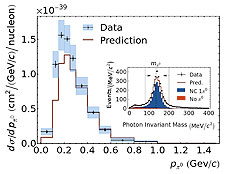MiniBooNE serves up a slice of π
 |
| The measured cross section for neutrino-induced neutral current π0
production as a function of π0 momentum. The inset shows the
distribution of the two-photon invariant mass where a peak around the π0
mass is obvious. The visible discrepancy between the data and this commonly used model
further motivates the need for improved experimental measurements of this production channel. |
Imagine you toss a football to your friend, but when it gets there, it's a baseball. Bizarre, right? Well, every time a neutrino of a particular flavor (electron, muon or tau) flies through space, there is a chance that it won't be the same flavor at the end of its journey. Studying this phenomenon, known as neutrino oscillation, yields new insight into the nature of nature.
In particular, measuring the probability that a muon neutrino will transition to an electron neutrino may help resolve the long-standing question of why there is far more matter than antimatter in the universe. This probability is measured by sending a beam of muon neutrinos to a detector and counting how many electron neutrinos appear. When electron neutrinos interact in the detector they typically produce a single electron, which starts an electromagnetic shower of photons, electrons and positrons. This shower is the smoking gun that indicates the presence of an electron neutrino.
However, one has to watch out for other particle interactions that can fake this signal. MiniBooNE is the first experiment to carefully determine the kinematics of one of the major background processes, π0 production. This measurement utilized the world's largest sample of neutrino-induced π0 events ever recorded.
Neutrinos of any flavor can interact in the MiniBooNE detector and produce a π0 through neutral current interactions. The π0 decays very quickly to two photons, which each produce electromagnetic showers, much like the electron. If one of the photons goes undetected, the event is indistinguishable from an electron-neutrino signature, creating a rather pernicious background.
The task of counting electron neutrinos, as Colin Anderson, a graduate student at Yale University and lead on the π0 analysis puts it, "becomes akin to being color blind and having to count the number of red jelly beans in a jar full of all colors."
Read more
|